As You Like It
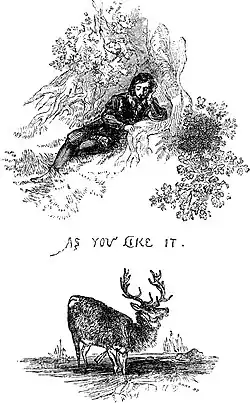
As You Like It is a pastoral comedy by William Shakespeare, believed to have been written in 1599 and first published in the First Folio in 1623. The drama follows its heroine Rosalind as she flees persecution in her uncle's court, accompanied by her cousin Celia to find safety and, eventually, love, in the Forest of Arden.
- W. G. Clark; W. A. Wright (eds.) The Works of William Shakespeare, vol. 2 (Cambridge and London: Macmillan and Co., 1863)
Act I
Scene i
- Bequeathed me by will but poor a thousand crowns.
- Orlando, l. 2
- Report speaks goldenly of his profit.
- Orlando, l. 5
- The spirit of my father, which I think is within me, begins to mutiny against this servitude.
- Orlando, l. 19
- The courtesy of nations allows you my better, in that you are the first-born; but the same tradition takes not away my blood, were there twenty brothers betwixt us: I have as much of my father in me as you.
- Orlando, l. 41
- The spirit of my father grows strong in me.
- Orlando, l. 63
- Give me the poor allottery my father left me by testament; with that I will go buy my fortunes.
- Orlando, l. 66
- I no further offend you than becomes me for my good.
- Orlando, l. 71
- Now will I stir this gamester.
- Oliver, l. 145
- I hope I shall see an end of him; for my soul, yet I know not why, hates nothing more than he.
- Oliver, l. 146
- Yet he’s gentle; never schooled, and yet learned; full of noble device; of all sorts enchantingly beloved; and indeed so much in the heart of the world, and especially of my own people, who best know him, that I am altogether misprised.
- Oliver, l. 148
- This wrestler shall clear all: nothing remains but that I kindle the boy thither.
- Oliver, l. 152
Scene ii
- I show more mirth than I am mistress of; and would you yet I were merrier? Unless you could teach me to forget a banished father, you must not learn me how to remember any extraordinary pleasure.
- Rosalind, l. 2
- I will forget the condition of my estate, to rejoice in yours.
- Rosalind, l. 12
- Celia: Let us sit and mock the good housewife Fortune from her wheel, that her gifts may henceforth be bestowed equally.
Rosalind: I would we could do so; for her benefits are mightily misplaced; and the bountiful blind woman doth most mistake in her gifts to women.
Celia: ’Tis true; for those that she makes fair she scarce makes honest; and those that she makes honest she makes very ill-favouredly.
Rosalind: Nay, now thou goest from Fortune’s office to Nature’s: Fortune reigns in gifts of the world, not in the lineaments of Nature.- l. 28
- How now, wit! whither wander you?
- Celia, l. 51
- Cf. A Midsummer Night's Dream, act 2, sc. 1, l. 1: “How now, spirit! whither wander you?”
- Celia, l. 51
- The more pity, that fools may not speak wisely what wise men do foolishly.
- Touchstone, l. 78
- Since the little wit that fools have was silenced, the little foolery that wise men have makes a great show.
- Celia, l. 80
- Celia: Here comes Monsieur Le Beau.
Rosalind: With his mouth full of news.
Celia: Which he will put on us, as pigeons feed their young.
Rosalind: Then shall we be news-crammed.- l. 82
- Well said: that was laid on with a trowel.
- Celia, l. 94
- Celia: Young gentleman, your spirits are too bold for your years. You have seen cruel proof of this man’s strength: if you saw yourself with your eyes, or knew yourself with your judgement, the fear of your adventure would counsel you to a more equal enterprise. We pray you, for your own sake, to embrace your own safety, and give over this attempt.
Rosalind: Do, young sir; your reputation shall not therefore be misprised: we will make it our suit to the Duke that the wrestling might not go forward.
Orlando: I beseech you, punish me not with your hard thoughts; wherein I confess me much guilty, to deny so fair and excellent ladies any thing. But let your fair eyes and gentle wishes go with me to my trial: wherein if I be foiled, there is but one shamed that was never gracious; if killed, but one dead that is willing to be so: I shall do my friends no wrong, for I have none to lament me, the world no injury, for in it I have nothing; only in the world I fill up a place, which may be better supplied when I have made it empty.
Rosalind: The little strength that I have, I would it were with you.- l. 155
- Your heart’s desires be with you!
- Celia, l. 178
- If I had a thunderbolt in mine eye, I can tell who should down.
- Celia, l. 193
- One out of suits with fortune.
- Rosalind, l. 225
- Sir, you have wrestled well and overthrown
More than your enemies.- Rosalind, l. 233
- My pride fell with my fortunes.
- Rosalind, l. 231
- Hereafter, in a better world than this,
I shall desire more love and knowledge of you.- Le Beau, l. 263
Scene iii
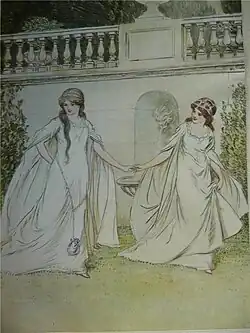
Coupled and inseparable.
- Celia: Not a word?
Rosalind: Not one to throw at a dog.- l. 2
- O, how full of briers is this working-day world!
- Rosalind, l. 11
- We still have slept together,
Rose at an instant, learn’d, play’d, eat together,
And wheresoe’er we went, like Juno’s swans,
Still we went coupled and inseparable.- Celia, l. 69
- Beauty provoketh thieves sooner than gold.
- Rosalind, l. 106
_12000px.jpg)
As many other mannish cowards have.
- Were it not better,
Because that I am more than common tall,
That I did suit me all points like a man?
A gallant curtle-axe upon my thigh,
A boar-spear in my hand; and—in my heart
Lie there what hidden woman’s fear there will—
We’ll have a swashing and a martial outside,
As many other mannish cowards have
That do outface it with their semblances.- Rosalind, l. 110
Act II
Scene i
- Hath not old custom made this life more sweet
Than that of painted pomp? Are not these woods
More free from peril than the envious court?- Duke Senior, l. 2
- Here feel we but the penalty of Adam,
The seasons’ difference; as the icy fang
And churlish chiding of the winter’s wind,
Which, when it bites and blows upon my body,
Even till I shrink with cold, I smile and say
‘This is no flattery.’- Duke Senior, l. 5
- Sweet are the uses of adversity;
Which, like the toad, ugly and venomous,
Wears yet a precious jewel in his head:
And this our life exempt from public haunt
Finds tongues in trees, books in the running brooks,
Sermons in stones and good in every thing.- Duke Senior, l. 12
- The big round tears
Coursed one another down his innocent nose
In piteous chase.- First Lord, l. 38
- ‘Poor deer,’ quoth he, ‘thou makest a testament
As worldlings do, giving thy sum of more
To that which had too much.’- First Lord, l. 47, quoting Jaques
- ‘Sweep on, you fat and greasy citizens.’
- First Lord, l. 55, quoting Jaques
Scene ii
- I thank God I am not a woman, to be touched with so many giddy offences as he hath generally taxed their whole sex withal.
- Rosalind, l. 324
- There is a man haunts the forest, that abuses our young plants with carving Rosalind on their barks; hangs odes upon hawthorns and elegies on brambles.
- Rosalind, l. 334
Scene iii
- And He that doth the ravens feed,
Yea, providently caters for the sparrow,
Be comfort to my age!- Adam, l. 43
- For in my youth I never did apply
Hot and rebellious liquors in my blood.- Adam, l. 48
- Though I look old, yet I am strong and lusty;
For in my youth I never did apply
Hot and rebellious liquors in my blood,
Nor did not with unbashful forehead woo
The means of weakness and debility;
Therefore my age is as a lusty winter,
Frosty, but kindly.- Adam, l. 47
- O good old man, how well in thee appears
The constant service of the antique world,
When service sweat for duty, not for meed!
Thou art not for the fashion of these times,
Where none will sweat but for promotion.- Orlando, l. 56
- But, poor old man, thou prunest a rotten tree,
That cannot so much as a blossom yield
In lieu of all thy pains and husbandry.- Orlando, l. 63
- Master, go on, and I will follow thee,
To the last gasp, with truth and loyalty.- Adam, l. 69
Scene iv
- Ay, now am I in Arden; the more fool I; when I was at home, I was in a better place: but travellers must be content.
- Touchstone, l. 13
- If thou remember’st not the slightest folly
That ever love did make thee run into,
Thou hast not loved:- Silvius, l. 31
- I shall ne’er be ware of mine own wit till I break my shins against it.
- Touchstone, l. 54
- My master is of churlish disposition
And little recks to find the way to heaven
By doing deeds of hospitality.- Corin, l. 75
Scene v
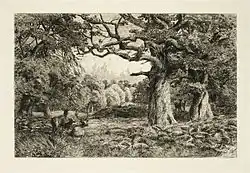
Who loves to lie with me?
- Under the greenwood tree
Who loves to lie with me,
And turn his merry note
Unto the sweet bird’s throat,
Come hither, come hither, come hither:
Here shall he see
No enemy
But winter and rough weather.- Amiens, l. 1
- Rowe (ed. 2): ‘tune’ for ‘turn’
- Amiens, l. 1
- I can suck melancholy out of a song, as a weasel sucks eggs.
- Jaques, l. 11
- Who doth ambition shun,
And loves to live i’ the sun,
Seeking the food he eats,
And pleased with what he gets,
Come hither, come hither, come hither:
Here shall he see
No enemy
But winter and rough weather.- Jaques, l. 34
- If it do come to pass
That any man turn ass,
Leaving his wealth and ease
A stubborn will to please,
Ducdame, ducdame, ducdame:
Here shall he see
Gross fools as he,
An if he will come to me.- Jaques, l. 46
Scene vi
- Live a little; comfort a little; cheer thyself a little.
- Orlando, l. 5
Scene vii
- A fool, a fool! I met a fool i’ the forest,
A motley fool; a miserable world!
As I do live by food, I met a fool;
Who laid him down and bask’d him in the sun.- Jaques, l. 12
- And rail’d on Lady Fortune in good terms,
In good set terms.- Jaques, l. 16
- And then he drew a dial from his poke,
And, looking on it with lack-lustre eye,
Says very wisely, ‘It is ten o’clock:
Thus we may see,’ quoth he, ‘how the world wags.’- Jaques, l. 20
- ‘And so, from hour to hour, we ripe and ripe,
And then, from hour to hour, we rot and rot;
And thereby hangs a tale.’- Jaques, l. 26
- Cf. The Taming of the Shrew, act 4, sc. 1. Grumio: “And thereby hangs a tale.” The Merry Wives of Windsor, act 1, sc. 4. Quickly: “Well, thereby hangs a tale.” Othello, act 3, sc. 1. Rabelais, bk. 5, ch. 4
- Jaques, l. 26
- My lungs began to crow like chanticleer,
That fools should be so deep-contemplative;
And I did laugh sans intermission
An hour by his dial.- Jaques, l. 30
- O noble fool!
A worthy fool! Motley’s the only wear.- Jaques, l. 33
- If ladies be but young and fair,
They have the gift to know it.- Jaques, l. 37
- And in his brain,
Which is as dry as the remainder biscuit
After a voyage, he hath strange places cramm’d
With observation, the which he vents
In mangled forms.- Jaques, l. 38
- I am ambitious for a motley coat.
- Jaques, l. 43
- I must have liberty
Withal, as large a charter as the wind,
To blow on whom I please.- Jaques, l. 47
- The ‘why’ is plain as way to parish church.
- Jaques, l. 52
- Why, who cries out on pride,
That can therein tax any private party?
Doth it not flow as hugely as the sea.- Jaques, l. 70
- The thorny point
Of bare distress hath ta’en from me the show
Of smooth civility.- Orlando, l. 94
- Sit down and feed, and welcome to our table.
- Duke Senior, l. 105
- Whate’er you are
That in this desert inaccessible,
Under the shade of melancholy boughs,
Lose and neglect the creeping hours of time;
If ever you have look’d on better days,
If ever been where bells have knoll’d to church,
If ever sat at any good man’s feast,
If ever from your eyelids wiped a tear
And know what ’tis to pity and be pitied,
Let gentleness my strong enforcement be.- Orlando, l. 109
- True is it that we have seen better days.
- Duke Senior, l. 120
- And wiped our eyes
Of drops that sacred pity hath engender’d.- Duke Senior, l. 122
- Oppress’d with two weak evils, age and hunger.
- Orlando, l. 132
- This wide and universal theatre
Presents more woeful pageants than the scene
Wherein we play in.- Duke Senior, l. 137
- Cf. Du Bartas
- Duke Senior, l. 137
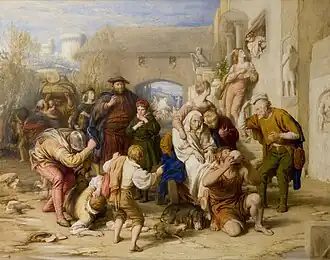
And all the men and women merely players:
They have their exits and their entrances;
And one man in his time plays many parts,
His acts being seven ages.
- All the world’s a stage,
And all the men and women merely players:
They have their exits and their entrances;
And one man in his time plays many parts,
His acts being seven ages. At first the infant,
Mewling and puking in the nurse’s arms.
Then the whining school-boy, with his satchel
And shining morning face, creeping like snail
Unwillingly to school. And then the lover,
Sighing like furnace, with a woeful ballad
Made to his mistress’ eyebrow. Then a soldier,
Full of strange oaths, and bearded like the pard,
Jealous in honour, sudden and quick in quarrel,
Seeking the bubble reputation
Even in the cannon’s mouth. And then the justice,
In fair round belly with good capon lined,
With eyes severe and beard of formal cut,
Full of wise saws and modern instances;
And so he plays his part. The sixth age shifts
Into the lean and slipper’d pantaloon,
With spectacles on nose and pouch on side,
His youthful hose, well saved, a world too wide
For his shrunk shank; and his big manly voice,
Turning again toward childish treble, pipes
And whistles in his sound. Last scene of all,
That ends this strange eventful history,
Is second childishness and mere oblivion,
Sans teeth, sans eyes, sans taste, sans every thing.- Jaques, l. 140
- Cf. Robert Conquest (alias Victor Gray):
Seven ages, first puking and mewling,
Then very pissed off with one's schooling,
Then fucks, and then fights,
Then judging chaps' rights;
Then sitting in slippers; then drooling.
- Cf. Robert Conquest (alias Victor Gray):
- Jaques, l. 140
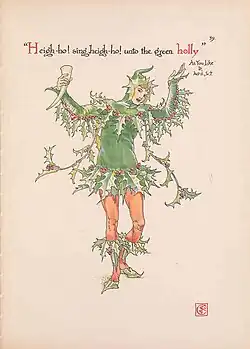
- Blow, blow, thou winter wind,
Thou art not so unkind
As man’s ingratitude;
Thy tooth is not so keen,
Because thou art not seen,
Although thy breath be rude.
Heigh-ho! sing, heigh-ho! unto the green holly:
Most friendship is feigning, most loving mere folly:
Then, heigh-ho, the holly!
This life is most jolly. Freeze, freeze, thou bitter sky
That dost not bite so nigh
As benefits forgot:
Though thou the waters warp,
Thy sting is not so sharp
As friend remember’d not.
Heigh-ho! sing, &c.- Amiens, l. 174
Act III
Scene i
- Sir, I am a true labourer: I earn that I eat, get that I wear, owe no man hate, envy no man’s happiness, glad of other men’s good, content with my harm, and the greatest of my pride is to see my ewes graze and my lambs suck.
- Corin, l. 65
Scene ii
- Run, run, Orlando; carve on every tree
The fair, the chaste and unexpressive she.- Orlando, l. 9
- It goes much against my stomach. Hast any philosophy in thee, shepherd?
- Touchstone, l. 20
- He that wants money, means and content is without three good friends.
- Corin, l. 23
- Thou art in a parlous state, shepherd.
- Touchstone, l. 40
- Those that are good manners at the court are as ridiculous in the country as the behaviour of the country is most mockable at the court.
- Corin, l. 41
- I earn that I eat, get that I wear, owe no man hate, envy no man’s happiness, glad of other men’s good, content with my harm.
- Corin, l. 65
- From the east to western Ind,
No jewel is like Rosalind.- Rosalind, l. 78, quoting Orlando
- Sweetest nut hath sourest rind,
Such a nut is Rosalind.- Touchstone, l. 99, quoting Orlando
- This is the very false gallop of verses.
- Touchstone, l. 103
- Why should this a desert be?
For it is unpeopled? No;
Tongues I’ll hang on every tree,
That shall civil sayings show.- Celia, reading Orlando, l. 115
- Helen’s cheek, but not her heart,
Cleopatra’s majesty,
Atalanta’s better part,
Sad Lucretia’s modesty.- Celia, reading Orlando, l. 135
- Let us make an honourable retreat; though not with bag and baggage, yet with scrip and scrippage.
- Touchstone, l. 150
- Cf. Richard Huloet
- Touchstone, l. 150
- O, wonderful, wonderful, and most wonderful wonderful! and yet again wonderful, and after that, out of all hooping.
- Celia, l. 178
- I prithee, take the cork out of thy mouth that I may drink thy tidings.
- Rosalind, l. 188
- Answer me in one word.
- Rosalind, l. 209
- It is as easy to count atomies as to resolve the propositions of a lover.
- Celia, l. 217

- Do you not know I am a woman? when I think, I must speak.
- Rosalind, l. 234
- I do desire we may be better strangers.
- Orlando, l. 243
- You have a nimble wit: I think ’twas made of Atalanta’s heels.
- Jaques, l. 260
- I will chide no breather in the world but myself, against whom I know most faults.
- Orlando, l. 263
- Time travels in divers paces with divers persons. I’ll tell you who Time ambles withal, who Time trots withal, who Time gallops withal, and who he stands still withal.
- Rosalind, l. 290
- Every one fault seeming monstrous till his fellow-fault came to match it.
- Rosalind, l. 330
- Rosalind: But are you so much in love as your rhymes speak?
Orlando: Neither rhyme nor reason can express how much.- l. 366
- Cf. Sir Thomas More
- l. 366
Scene iii
- I would the gods had made thee poetical.
- Touchstone, l. 12
- As a walled town is more worthier than a village, so is the forehead of a married man more honourable than the bare brow of a bachelor.
- Touchstone, l. 50
Scene iv
- Rosalind: His hair is of a good colour.
Celia: An excellent colour: your chestnut was ever the only colour.- l. 9
- And his kissing is as full of sanctity as the touch of holy bread.
- Rosalind, l. 12
- The very ice of chastity is in them.
- Celia, l. 15
Scene v
_12000px.jpg)
- Thou tell’st me there is murder in mine eye:
’Tis pretty, sure, and very probable,
That eyes, that are the frail’st and softest things,
Who shut their coward gates on atomies,
Should be call’d tyrants, butchers, murderers!- Phebe, l. 10
- But mistress, know yourself: down on your knees,
And thank heaven, fasting, for a good man’s love:
For I must tell you friendly in your ear,
Sell when you can: you are not for all markets.- Rosalind, l. 57
- Dead shepherd, now I find thy saw of might,
‘Who ever loved that loved not at first sight?’- Phebe, l. 80
- Cf. Marlowe, Hero and Leander, First Sestiad, l. 176
- Phebe, l. 80
- Wherever sorrow is, relief would be:
If you do sorrow at my grief in love,
By giving love your sorrow and my grief
Were both extermined.- Silvius, l. 85
- Faster than his tongue
Did make offence his eye did heal it up.- Phebe, l. 115
Act IV
Scene i
- It is a melancholy of mine own, compounded of many simples, extracted from many objects; and indeed the sundry contemplation of my travels, in which my often rumination wraps me in a most humorous sadness.
- Jaques, l. 14
- I have gained my experience.
- Jaques, l. 23
- I had rather have a fool to make me merry than experience to make me sad.
- Rosalind, l. 24
- Farewell, Monsieur Traveller: look you lisp and wear strange suits; disable all the benefits of your own country.
- Rosalind, l. 30
- I will scarce think you have swam in a gondola.
- Rosalind, l. 33
- I’ll warrant him heart-whole.
- Rosalind, l. 44
- For now I am in a holiday humour.
- Rosalind, l. 62
- Very good orators, when they are out, they will spit; and for lovers lacking,—God warn us!—matter, the cleanliest shift is to kiss.
- Rosalind, l. 67
- Men have died from time to time and worms have eaten them, but not for love.
- Rosalind, l. 94
- Orlando: And wilt thou have me?
Rosalind: Ay, and twenty such.
Orlando: What sayest thou?
Rosalind: Are you not good?
Orlando: I hope so.
Rosalind: Why then, can one desire too much of a good thing?- l. 103
- Cf. Cervantes, Don Quixote, pt. 1, bk. 1, ch. 6
- l. 103
- Orlando: I take thee, Rosalind, for wife.
Rosalind: I might ask you for your commission; but I do take thee, Orlando, for my husband: there’s a girl goes before the priest; and certainly a woman’s thought runs before her actions.
Orlando: So do all thoughts; they are winged.
Rosalind: Now tell me how long you would have her after you have possessed her.
Orlando: For ever and a day.
Rosalind: Say ‘a day,’ without the ‘ever’. No, no, Orlando; men are April when they woo, December when they wed: maids are May when they are maids, but the sky changes when they are wives.- l. 121
- Make the doors upon a woman’s wit and it will out at the casement; shut that and ’twill out at the key-hole; stop that, ’twill fly with the smoke out at the chimney.
- Rosalind, l. 144
- Time is the old justice that examines all such offenders, and let Time try.
- Rosalind, l. 178
- O coz, coz, coz, my pretty little coz, that thou didst know how many fathom deep I am in love! But it cannot be sounded: my affection hath an unknown bottom, like the bay of Portugal.
- Rosalind, l. 183
- That blind rascally boy that abuses every one’s eyes because his own are out, let him be judge how deep I am in love. I’ll tell thee, Aliena, I cannot be out of the sight of Orlando: I’ll go find a shadow and sigh till he come.
- Rosalind, l. 191
Scene ii
- What shall he have that kill’d the deer?
His leather skin and horns to wear.
Then sing him home:
Take thou no scorn to wear the horn;
It was a crest ere thou wast born:
Thy father’s father wore it,
And thy father bore it:
The horn, the horn, the lusty horn
Is not a thing to laugh to scorn.- Foresters, l. 10
Scene iii
- This is a man’s invention and his hand.
- Rosalind, l. 29
- Pacing through the forest,
Chewing the food of sweet and bitter fancy.- Oliver, l. 99
- Staunton: ‘cud’ for ‘food’
- Oliver, l. 99
Act V
Scene i
- It is meat and drink to me.
- Touchstone, l. 10

- ‘So so’ is good, very good, very excellent good; and yet it is not; it is but so so.
- Touchstone, l. 25
- I do now remember a saying, ‘The fool doth think he is wise, but the wise man knows himself to be a fool.’
- Touchstone, l. 28
- I will kill thee a hundred and fifty ways.
- Touchstone, l. 52
Scene ii
- No sooner met but they looked; no sooner looked but they loved; no sooner loved but they sighed; no sooner sighed but they asked one another the reason; no sooner knew the reason but they sought the remedy.
- Rosalind, l. 30
- How bitter a thing it is to look into happiness through another man’s eyes!
- Orlando, l. 40
- Phebe: Good shepherd, tell this youth what ’tis to love.
Silvius: It is to be all made of sighs and tears; ...
It is to be all made of faith and service; ...
It is to be all made of fantasy,
All made of passion, and all made of wishes;
All adoration, duty, and observance,
All humbleness, all patience, and impatience,
All purity, all trial, all observance.- l. 76
Scene iii
- It was a lover and his lass,
With a hey, and a ho, and a hey nonino,
That o’er the green corn-field did pass
In the spring time, the only pretty ring time,
When birds do sing, hey ding a ding, ding:
Sweet lovers love the spring. Between the acres of the rye,
With a hey, and a ho, and a hey nonino,
These pretty country folks would lie,
In spring time, &c. This carol they began that hour,
With a hey, and a ho, and a hey nonino,
How that a life was but a flower
In spring time, &c. And therefore take the present time,
With a hey, and a ho, and a hey nonino;
For love is crowned with the prime
In spring time, &c.- Pages, l. 14
Scene iv
- Here comes a pair of very strange beasts, which in all tongues are called fools.
- Jaques, l. 36
- An ill-favoured thing, sir, but mine own.
- Touchstone, l. 56
- Rich honesty dwells like a miser, sir, in a poor house; as your pearl in your foul oyster.
- Touchstone, l. 58
- O sir, we quarrel in print, by the book; as you have books for good manners: I will name you the degrees. The first, the Retort Courteous; the second, the Quip Modest; the third, the Reply Churlish; the fourth, the Reproof Valiant; the fifth, the Countercheck Quarrelsome; the sixth, the Lie with Circumstance; the seventh, the Lie Direct. All these you may avoid but the Lie Direct; and you may avoid that too, with an If. I knew when seven justices could not take up a quarrel, but when the parties were met themselves, one of them thought but of an If, as, ‘If you said so, then I said so;’ and they shook hands and swore brothers. Your If is the only peace-maker; much virtue in If.
- Touchstone, l. 85
- Wedding is great Juno’s crown:
O blessed bond of board and bed!
’Tis Hymen peoples every town;
High wedlock then be honourèd:
Honour, high honour and renown,
To Hymen, god of every town!- Hymen, l. 135
Epilogue
- If it be true that good wine needs no bush, ’tis true that a good play needs no epilogue
- Rosalind, l. 3
- What a case am I in.
- Rosalind, l. 6
- If I were a woman I would kiss as many of you as had beards that pleased me, complexions that liked me and breaths that I defied not: and, I am sure, as many as have good beards or good faces or sweet breaths will, for my kind offer, when I make curtsy, bid me farewell.
- Rosalind, l. 15
External links
 Encyclopedic article on As You Like It on Wikipedia
Encyclopedic article on As You Like It on Wikipedia Works related to As You Like It on Wikisource
Works related to As You Like It on Wikisource